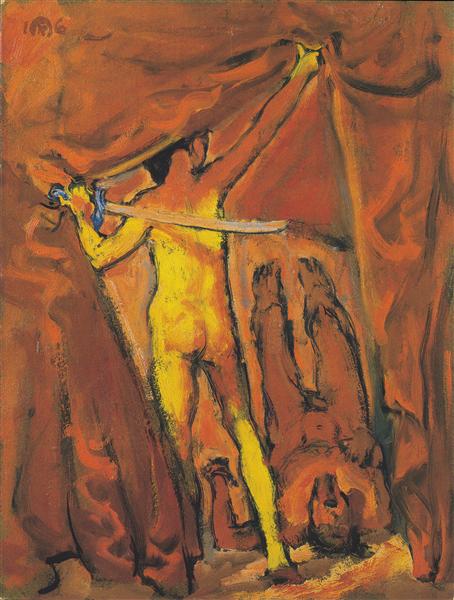Description
The work "Judit and Holofernes" by Koloman Moser, carried out in 1916, is part of a context of art where symbolism and modernism are intertwined, offering a unique interpretation of this well -known biblical theme. Moser, one of the most prominent members of the Vienna secession movement and the group of artists known as Wiener Werkstätte, uses in this work its characteristic decorative approach, in which the shape and color become indisputable protagonists.
The composition of the painting presents Judit in a moment of intense drama. You can see its figure in the foreground, dressed in a tunic of soft lines that fits its form, surrounded by a halo of decorative elements that provide a sense of movement and vitality. His eyes, expressive and determined, convey the female force that characterizes his character; On the contrary, Holofernes, represented by his side, seems oblivious to his destiny, plunged into an almost static representation that highlights the difference between both characters. Moser uses the juxtaposition between the figure of Judit, energetic and determined, and the image of Holofernes, more passive, to convey the central conflict of the narration: the struggle between women and men, and the tension inherent in that confrontation.
The color plays a fundamental role in the work. Moser opts for a palette rich in warm and cold tones, where Judit's deep red contrasts with the most out of holofernes, accentuating the prominence of heroin. This use of color not only delineates the emotions of the characters, but also establishes a surround, almost dreamlike atmosphere, which invites the viewer to dive into the scene. The way in which Moser applies the color, with techniques that recall the storm, adds an air of luminosity and symbolism to the work, reinforcing its sense of narration and connection with history and mythology.
The choice of an issue as emblematic as that of Judit and Holofernes is not fortuitous, since it represents a female figure of power that defies norms and expectations. Moser, in his representation of Judit, seems to break the standards of the traditional female painting of his time. The work not only captures a moment of action, but also echoes broader issues about the role of women in society and art, thus linking their work to more contemporary discussions.
In this sense, "Judit and Holofernes" can be seen as a reflection on the duality of power and vulnerability. Moser, through his distinctive style and a meticulous technique, manages not only to portray two iconic characters, but also evoke complex emotions and psychological tensions that resonate beyond the mere biblical story. This fusion of symbolism, modernism and a distinctive approach to color and shape place this work in a special place within the artist's repertoire, as well as in the history of the art of the twentieth century.
In summary, the work "Judit and Holofernes" by Koloman Moser stands not only as a visual representation of an ancient story, but as a meditation on the human condition through the prism of modern symbolism. The interaction between the characters, the bold use of color and the deep emotional burden make this painting a fundamental piece to understand both Moser's legacy and the evolutions of art in its time.
KUADROS ©, a famous paint on your wall.
Hand-made oil painting reproductions, with the quality of professional artists and the distinctive seal of KUADROS ©.
Art reproduction service with satisfaction guarantee. If you are not completely satisfied with the replica of your painting, we refund your money 100%.

